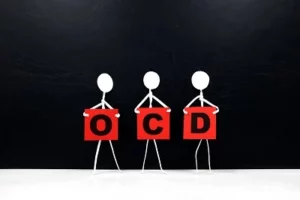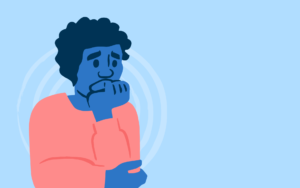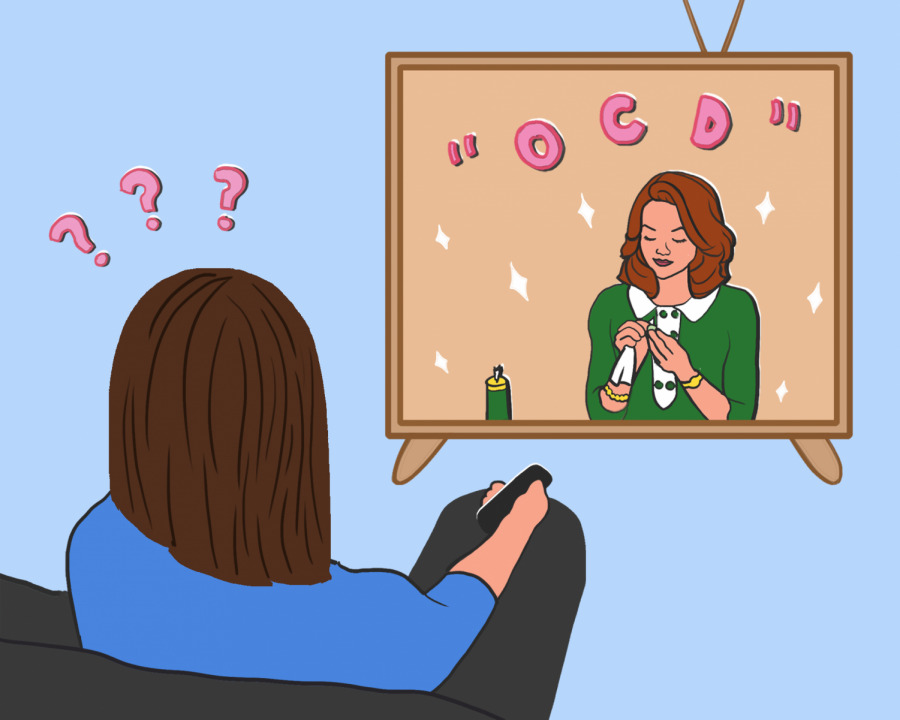Do you feel like you’re constantly in a state of chaos? Are you plagued by intrusive thoughts that make it difficult to focus on anything else? If so, you may be struggling with OCD. OCD is a mental illness that affects millions of people around the world. It can be very challenging to live with, but there is hope! In this blog post, we will discuss what OCD feels like, and how you can get help.
What Is OCD?

One might never be too unfamiliar with the term OCD. However, a lot of people have a pretty big misunderstanding of what it is. OCD stands for Obsessive Compulsive Disorder. It is classified as an anxiety disorder, which means that it causes individuals to feel persistent and excessive amounts of fear or worry. People who struggle with OCD often have intrusive thoughts that are difficult to control or ignore.
OCD has various subtypes. Each subtype is characterized by different obsessions and compulsions. Some of the most common subtypes include:
- Checking
- Contamination
- Hoarding
- Intrusive Thoughts
- Perfectionism
While all of them differ in character and nature, it is important to remember that they all share the same root: anxiety. OCD is often driven by a fear of something bad happening. This can take shape of many different things, such as a fear of germs or a fear of making mistakes. For some people, OCD can be very mild and manageable, while some may find it threatening and debilitating.
What Does OCD Feel Like?
Now that we know the basics of OCD, we will now understand what it can feel like for someone who has this condition.
Isolating

As we all know, one of the biggest effects of OCD is on a person’s life. The nature of the symptoms can make it difficult for people to interact with the world. This can lead to social anxiety and isolation. People with OCD often feel like they’re on the outside looking in. They may avoid social situations or places that trigger their symptoms. It is also hard to explain to others what you are going through, and as a result, many people feel misunderstood. Moreover, it has been observed that most people feel uncomfortable or weird around someone who has a mental illness such as OCD. This may be due to the fact that mental illness is still quite taboo in our society. This can lead to alienation, exclusion, and isolation.
Exhausting
Another big impact of OCD is how draining it can be, both mentally and physically. This is because the constant battle with intrusive thoughts and compulsions can be very difficult to balance. People with OCD often report feeling like they are running on empty. They may have difficulty focusing or completing daily tasks. Moreover, OCD also has effects on one’s sleep cycle. This can further lead to feelings of exhaustion, tiredness, or even burnout. All in all, it is not surprising that many people with OCD feel like they are struggling to keep up with the demands of their life.
Confusing and overwhelming

Confusion is one of the most common feelings associated with OCD. This is because the thoughts and compulsions can be very confusing and hard to make sense of. They may feel like they are going in circles, or that they will never be able to escape their symptoms. Moreover, the constant battle with intrusive thoughts can be very overwhelming. This can lead to feeling hopeless, helpless, and even defeated. The struggle to balance daily life expectations along with the heavily demanding OCD symptoms can be very daunting. Moreover, OCD can also feel like it is constantly changing. The obsessions and compulsions can vary in intensity, frequency, and duration. This can make it hard to keep up with the treatment plan. This can look like feeling like you are constantly chasing your tail.
Time-consuming
By now, we are well aware that as a disorder, OCD can be very time-consuming. This is because obsessions and compulsions can take up a lot of time. They may interfere with work, school, or other important aspects of life. In some cases, they may even consume someone’s entire day. This can lead to a lot of lost opportunities and potential experiences. It can also be very frustrating for the people around them. This is because they may not understand why the person with OCD is spending so much time on their symptoms. Some examples of time-consuming OCD behaviors include:
- Checking compulsions (e.g., checking the stove to make sure it is off)
- Counting or ordering compulsions (e.g., needing to arrange objects in a certain way)
- Mental rituals (e.g., going over events in your head to try and prevent something bad from happening)
- Avoidance (e.g., avoiding people or places that trigger your OCD symptoms)
As you can see, there are many different ways that OCD can consume someone’s time. This can lead to a lot of problems in one’s ongoing life.
Triggering

One of the biggest factors behind OCD becoming worse than before is triggers. Triggers are anything that sets off a person’s symptoms. They can be internal (thoughts, emotions, memories) or external (sights, sounds, smells). For many people with OCD, triggers are everywhere. This can make it very hard to escape their symptoms and can often lead to feeling trapped. Some examples of common triggers include:
- Certain words or phrases
- Certain numbers or sequences
- Messy or cluttered environments
- Loud noises
- Strong smells
As you can see, triggers can be very different for each person. They may also change over time. This can make it hard to predict when OCD symptoms will flare up. This type of uncertainty and unpredictability can be very difficult to manage.
Intrusive thoughts
We have talked a lot about intrusive thoughts already, but it is worth mentioning again. This is because intrusive thoughts are one of the most distressing symptoms of OCD. They are unwanted, often disturbing, and can be very hard to control. Intrusive thoughts may be about any number of things, such as:
- Fear of harming yourself or others
- Excessive concern with hygiene and contamination
- Excessive focus on certain body parts or physical sensations
- Unwanted sexual or aggressive thoughts
- Obsessions with certain topics, such as germs, dirt, or death
As you can see, intrusive thoughts can be very different for each person. They may also change over time. Intrusive thoughts can be very frightening. They may cause a lot of anxiety and distress. In some cases, they may even lead to panic attacks, depression, or suicidal thoughts. If you are experiencing intrusive thoughts, it is important to get help from a mental health professional.
Anxiety provoking

Last but not least, anxiety is a huge part of what it feels like to have OCD. This is because anxiety is one of the main driving factors behind OCD. For many people, their OCD symptoms are driven by a fear of something bad happening. This can be a fear of germs, a fear of making mistakes, or a fear of not being perfect. This constant state of anxiety can be very exhausting and overwhelming. It is not uncommon for people with OCD to feel like they are in a constant state of chaos.
Moreover, constant anxiety, cross-questioning, and skepticism can also lead to doubt. People with OCD often doubt themselves, their decisions, and even their own sanity. This can be a very scary and confusing place to be in. As we know, intrusive thoughts are a huge part of OCD. They are often unwanted and intrusive thoughts that can be very disturbing. For many people, these thoughts can be so distressing that they avoid any situation that might trigger them. This can make them question themselves and make one think of things such as “what if I am a bad person” or “what if I hurt someone.”
All in all, OCD can be a very confusing and difficult condition to live with. However, there is hope. With the right treatment plan and support system, many people with OCD are able to live happy and fulfilling lives. It is important to remember that OCD is a chronic condition, which means that it can come and go throughout a person’s life. If you or someone you know is struggling with OCD, know that there is help available. There are many resources out there that can provide support and guidance. Treatment for OCD can be very effective, so do not hesitate to reach out for help.
How To Deal With It?

Now that we know more about what does OCD feel like for someone going through it, we will now look at some ways to manage it. Knowing how to deal with a mental health disorder is not only important for the ones going through it, but also for their loved ones. This is important to do so in order to not only provide support but also to understand the challenges that come with it.
Establish a support system
The very initial step to managing OCD is to establish a supportive environment. This can be in the form of family, friends, or a therapist. It is important to have people around you that understand your condition and can provide support when needed. These people can help you through tough times and offer guidance when needed. You may also consider seeking support from support groups. They are specialized spaces that are designed to provide support and guidance to those with OCD.
Create a routine
Another way to manage OCD is by creating a daily routine. This can help to structure your day and give you a sense of control. Having a set schedule can help to minimize anxiety and doubts. It can also be helpful to create routines for specific activities, such as bedtime or mealtimes. This can help to ease any anxiety that may be associated with these activities.
Challenge your thoughts
One of the most important things you can do is to challenge your intrusive thoughts. This means learning to question the validity of your thoughts and recognizing when they are coming from your OCD. This can mean learning to reframe your thoughts in a more positive light. For example, instead of thinking “I am a bad person,” you can challenge that thought by thinking “I am a good person.” This can help to reduce the power that your OCD has over you.
Be aware and responsible
Being aware of your symptoms, thoughts, and triggers is an important part of managing OCD. This can help you to better understand your condition and how it affects you. It can also help you to identify when you are starting to experience symptoms, so that you can take steps to manage them. Additionally, being aware of your thoughts and triggers can help you to avoid situations that may make your condition worse or make you vulnerable to danger. For example, if you are triggered by the sight of blood, you may want to avoid situations where there is a lot of blood, such as the hospital.
Initiate conversations
One of the biggest reasons OCD feels isolating and burdening is because of the lack of conversation and understanding around it. This is why it is so important to initiate conversations about OCD. This can help to raise awareness and understanding about the condition. It can also help to reduce the stigma surrounding mental health conditions. Talking openly about OCD can also help you to feel more supported and less alone. You can start by talking to your family and friends about your condition. You can also reach out to support groups or mental health professionals.
Be empathetic and patient
This goes for both, people suffering from OCD and the ones around them. We know that it is an extremely tough battle. So, be patient with yourself and the people you love. Surround yourself with people that understand your journey and can provide empathy when needed. And most importantly, do not hesitate to ask for help! Similarly, if someone you know is struggling with OCD, be patient with them and try to understand what they are going through. Showing empathy can go a long way in helping them feel supported.
Encourage healthy life practices
It is no secret that living a healthy lifestyle can improve mental health. This means eating a balanced diet, exercising regularly, and getting enough sleep. These activities can help to reduce stress and anxiety. They can also help to improve your mood and overall sense of well-being. Additionally, these healthy habits can help to support your immune system, which can be important in managing OCD.
Seek professional help
Lastly, if you think you might have OCD, talk to your doctor or a mental health professional. This is important because there are many different conditions that can cause similar symptoms. A professional will be able to give you a proper diagnosis and develop a treatment plan that is right to fit your individual condition. This can happen through medication, therapy, or a combination of both.
There are many different ways that you can manage OCD. It is important to find what works best for you. Remember, you are not alone in this! There is help available if you reach out for it.
Conclusion
In conclusion of the above, we answered a very complex and often overlooked question, “what does OCD feel like?”. We understood the basics of the condition, what causes it and some very important do’s and don’ts to keep in mind while struggling with OCD. Hope this post was helpful in providing some clarity! OCD is a tough battle, but with the correct knowledge and support system, it is definitely possible to manage it.
If you or someone you know is struggling with OCD, it is important to remember that there is hope. There are many treatment options available, and with the right help, people can learn to manage their symptoms and live a fulfilling life. If you would like to learn more about OCD, or if you are looking for help, please reach out to Therapy Mantra. We have a team of experienced mental health professionals who can help you learn how to manage your OCD symptoms. Our services are available from all across the globe at affordable rates. Contact us today to book a session or download our free OCD treatment app on Android or iOS for more information.


